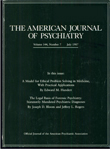Reported pathological childhood experiences associated with the development of borderline personality disorder
Abstract
OBJECTIVE: The purpose of this study was to assess a full range of pathological childhood experiences reported by patients with criteria- defined borderline personality disorder and comparison patients with other personality disorders. METHOD: The pathological childhood experiences reported by 467 inpatients with personality disorders were assessed by interviewers who used a semistructured research interview and were blind to clinical diagnosis. RESULTS: Of the 358 patients with borderline personality disorder, 91% reported having been abused, and 92% reported having been neglected, before the age of 18. The borderline patients were significantly more likely than the 109 patients with other personality disorders to report having been emotionally and physically abused by a caretaker and sexually abused by a noncaretaker. They were also significantly more likely to report having a caretaker withdraw from them emotionally, treat them inconsistently, deny their thoughts and feelings, place them in the role of a parent, and fail to provide them with needed protection. The borderline patients with a childhood history of sexual abuse were significantly more likely than those without such a history to report having experienced all but one of the types of abuse and neglect studied. When all significant risk factors were considered together, four were found to be significant predictors of a borderline diagnosis: female gender, sexual abuse by a male noncaretaker, emotional denial by a male caretaker, and inconsistent treatment by a female caretaker. CONCLUSIONS: The results suggest that sexual abuse is neither necessary nor sufficient for the development of borderline personality disorder and that other childhood experiences, particularly neglect by caretakers of both genders, represent significant risk factors.



